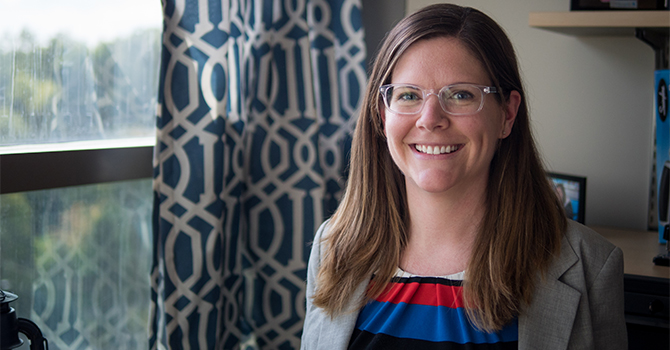Clearing the Air: Risk Assessment of Asbestos Exposures in Detroit

Stephanie Sayler
MS ’16, Environmental Health Sciences; Senior Research Area Specialist, Michigan Public Health
I joined the Navy right out of high school, which continued a family tradition—both of my parents and both of my mother's parents were in the Navy. I entered the Navy Nuclear Power Program and was assigned to do radiation exposure control on the nuclear powered aircraft carrier USS George Washington. That's how I got into worker health and safety.
After the Navy, I went on to earn a bachelor's degree in psychology from Armstrong State University in Savannah, Georgia. Then I came to the University of Michigan to work as a research staff member for Rick Nietzel, associate professor of environmental health sciences. After a year and a half, I began the master's program in industrial hygiene and earned my Master of Science degree in 2016.
A lot of the issues we look at in environmental health are related to environmental justice. The exposures that very wealthy people experience are not the same as the exposures experienced in low income neighborhoods and industrializing nations. I'm passionate about human rights and making sure things are as equitable as possible. That's how environmental health factors into that—they're not putting landfills in wealthy areas, they're putting them next to more impoverished areas. People need advocates to stand up and demonstrate that these exposures are unnecessary and unfair.
One of our ongoing research projects involves electronic waste disposal workers in Thailand, Chile, and Ghana. Something that's different between Thailand and Chile that I really found interesting is the cultural norms around social interaction. The participants in Thailand weren't as open to telling us about their stories and health, while the participants in Chile were more inclined to almost overshare. Culturally, when you meet someone in Thailand, you don't touch them—you bow. On the other hand, when you meet somebody in Chile, you kiss them. Usually when you are a researcher, it's all business, but when you are a researcher in Chile, you kiss all the participants. I've never kissed so many people!
Check out this video about another project we are currently working on, doing asbestos testing of abandoned homes during demolition for the City of Detroit.
